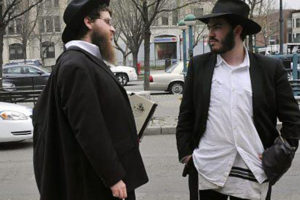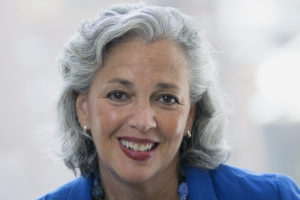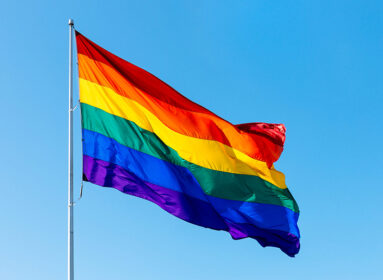
Amid spate of attacks on Orthodox Jews in Brooklyn, community urges action
By Shiryn Ghermezian
(JNS) Esther Gopin is fearful to go out in the Crown Heights neighborhood in Brooklyn, N.Y., where she’s lived her whole life. Many of her friends who feel the same decided to stay home for Labor Day, instead of going out to celebrate, and have recently bought pepper spray to protect themselves in the street against potential attackers.
Gopin, 23, spoke to JNS about this heightened sense of fear among her and her visibly Jewish peers after her father, Rabbi Avraham Gopin – who is a first cousin of Rabbi Joseph Gopin of Chabad House in West Hartford – was attacked at a local park on August 27 by an African-American man, who yelled an antisemitic slur and threw a large rock at and punched the 63-year-old. The attack was captured on video; Rabbi Gopin suffered a broken nose, had his two front teeth knocked out and had to get staples in his head where the rock hit him.
Three attacks took place against Hassidic Jews of late in Brooklyn, each just days apart. Two of the incidents happened in Crown Heights – home of the Chabad-Lubavitch movement – and are being considered possible hate crimes.
The attack directed at Avraham Gopin is one of several recent attacks on Hassidic Jews in Brooklyn. In most cases, no arrest has taken place. In the case of Gopin, New York police arrested this week Oniel Gilbourne, 26, who faces charges of assault as a hate crime and criminal possession of a weapon.
As of Aug. 25, New York police were investigating 145 antisemitic crimes, most of them in Brooklyn, compared to 88 from the same time period last year, the New York Daily News reported.
“I never felt really afraid until now. If my father, who is this big, tough guy, can get attacked literally in broad daylight, just blocks away from my house, I’m at risk, too–probably even more so because I’m an easier victim,” said Esther. “There’s just this fear where you’re constantly looking over your shoulder because you don’t feel safe in your own community.”
According to CBS New York, police said there have been nearly 150 antisemitic hate-related complaints in the city so far this year, which is nearly double the amount they received the same time in 2018.
Esther expressed frustration with the NYPD’s handling of her father’s case, saying authorities didn’t arrive to the scene of the attack until hours after it occurred and incorrectly wrote in the police report that her father instigated the fight with his attacker. She also noted that at first, the police didn’t believe her father when he explained what happened.
She called it a “very invalidating, upsetting and frustrating feeling when the police are condescending and disbelieving, and they make you out like you’re a liar when you have nothing to gain from lying. You go about your day and someone attacks you, and then to add insult to injury, the police don’t take you seriously.”
A focus on education in schools
Rabbi Yaacov Behrman, a leader in Crown Heights and founder of the New York-based volunteer group Jewish Future, attributed the increased frequency at which Jews are being attacked to wrongful accusations that the Jewish population is responsible for gentrification.
“There are people in Brooklyn preaching hate, and blaming Jews for gentrification and displacement,” he said. “To peddle this lie that one group in society is treated different than another group is the very definition of antisemitism. Gentrification is about economics, not race.”

Orthodox Jewish men in the Crown Heights neighborhood of Brooklyn, N.Y. Photo by Serge Attal/Flash90.
He encouraged increased police presence in the area and said the state should focus on creating evidence-based prevention programs in the local schools. He added that “speculation and guesswork is not working for us. We need to conduct a thorough study in the schools to better understand why we are seeing an increase in hate crime and attacks, and create a curriculum based on the results of this study.”
To also get a better understanding of such attacks, the Office for the Prevention of Hate Crimes opened early in September under the leadership of New York City Mayor Bill de Blasio. Brooklyn Councilman Chaim Deutsch, who helped create the office, said it will focus on educating others about the impact of hate crimes across the city (see story p. 13). He hopes that the office will also work with victims of hate crimes to get a better understanding about how attacks impact lives.
Arthur Stark, chairman, and Malcolm Hoenlein, executive vice chairman and CEO of the Conference of Presidents of Major American Jewish Organizations, welcomed the launch of the new office.
“We hope it will stem the tide of increased acts against Jews and others,” Hoenlein said of the new office. “The sharp increase in bias incidents in recent years, particularly of antisemitic crimes, requires a coordinated approach to maximize the resources available from all facets of law enforcement to prosecutors to the educational system to the voluntary sector.”
Deutsch also said he met with the NYPD on Wednesday, Sept. 4 to discuss the $1.6 million that he funded, through his budget, to install NYPD surveillance cameras, also known as Argus cameras.
‘No one seems to really care’
Brooklyn residents are pushing for a greater police presence in their neighborhoods, with Deutsch agreeing that “adding visibility” by having more uniformed officers on the street is “instrumental” in tackling and preventing violent crimes head on. He also called for stricter hate-crime laws to “make sure those who have hate in their blood get what they deserve and are held accountable for their actions.”
The councilman met with the NYPD police commissioner, and is starting a new program to expand the NYPD’s auxilliary volunteer program to have the officers protect each other’s houses of worship. He is also proposing a bill in city council that will have hate crimes included as one of the seven major index crimes designated by the NYPD, so that they are examined at a greater length by the city.
“It’s not just the seven index crimes they should be speaking about. They should also be speaking about hate crimes,” he said. “Why do you have three hate crimes in your precinct? Do you have enough officers on patrol? Have you been communicating with the people in your district? Have you been working with the Hate Crime Task Force? Have you been doing outreach to community centers and community groups? We need to hold the administration accountable for every hate crime.”
Esther Gopin said she feels like the NYPD makes false promises about placing more uniformed officers on patrol, and that in Crown Heights there is insufficient police response when Jews are attacked, as if “no one seems to really care.”
“I don’t know if the Jewish community isn’t making enough of a ruckus, but I do know that action is not being taken,” she said. “People aren’t afraid to do what they want because the cops won’t step in, and it seems like not much is being done to protect the community. I know for a fact that people in my community are victims of antisemitic attacks all the time, and they do not report it to the police. It’s just not worth the struggle, the bother, [so] they don’t speak out about it. People don’t really feel confident going to the police because they might be ridiculed the way my father was at first.
“I think that they should be encouraged to always make a report,” she urged. “Make a fuss, if they can, to speak out about it because there needs to be a record. If complaints about this are not being lodged, there’s no way for anyone to know what’s happening and then there’s no way for a response–for people to take appropriate action to solve the problem.”
Leah Zagelbaum, vice president of media affairs at the Orthodox Jewish organization Agudath Israel, told JNS her son was hospitalized after being the victim of an antisemitic hate crime in Brooklyn almost a year ago. He refused to press charges and didn’t even want to report the attack to police; he “just wanted to close the book and move on,” she said.
Zagelbaum explained there is a definite shift among Orthodox Jews turning to the police for help, and that the confidence people once had to approach authorities is “starting to erode.” People have a “hesitancy to report” incidents to the police because there is a feeling “that there is no attention being paid.”
At the same time, she concluded, “It’s easy to point the finger at law enforcement agencies and say they are not doing enough. Our law enforcement agencies work hard, and I don’t think that they can be held accountable for everything in our society. I think they are one significant piece. I hope to see them do the absolute most that they can, and I hope to see all citizens respect each other and treat each other with tolerance.”
Despite the fear that many Brooklyn residents have following the recent attacks and the rise of antisemitic hate crimes across the spectrum, Behrman’s message to the Jewish community is to “be a proud Jew, and wear your kipah with pride and honor.” Deutsch said: “Don’t change your garb. Don’t be afraid to walk in the streets. We will tackle the cancer that is hate without you having to compromise your beliefs.”
Zagelbaum encouraged vigilance, being awareness of one’s immediate surroundings, and added that “pride in who we are tempered with caution and common sense is always good.”
New York’s new hate crimes chief tackles rising antisemitism
By Ben Sales
(JTA) – Like other local officials, Deborah Lauter can’t say exactly what’s causing the recent spike in hate crimes against Jews in New York City.
It could be, in her words, “the rhetoric that’s coming out of various elected officials.” It could be animus among the city’s diverse communities. It could be that the attacks are getting more press and therefore inspiring copycats. It could just be a hot summer when people need to blow off steam.
“It’s difficult to make generalizations,” Lauter said. “When you look at escalation of swastikas on buildings, are these copycat attacks because they’re in the press a lot and perpetrators are inspired by that? Or are they being inspired by demonization of individuals and groups?”
Lauter is now the one tasked with answering those questions.
On Tuesday, City Hall announced her appointment as head of the new Office for the Prevention of Hate Crimes. The announcement follows a New York Police Department report from a few months earlier showing a 64 percent rise in hate crimes in the first months of 2019 over the same period last year. Attacks on Jews in particular nearly doubled, to 110 from 58.
Lauter plans to focus on educating kids against hate – for example, teaching them what a swastika is and why it’s offensive. She will coordinate with 10 agencies, from police to mental health programs, that are tasked in some way with addressing hate. And she plans to emphasize community relations with adults in tense neighborhoods.
Lauter praised the NYPD Hate Crimes Task Force for working to protect vulnerable groups, but said neighbors of different backgrounds don’t always protect each other.
“Do I get a sense that groups stick up for the other? Maybe not as much,” she said.
“I think the Hasidic community in particular is feeling a bit isolated and wondering if others care about what’s happening to them,” she added, referring to Orthodox Jewish neighborhoods in Brooklyn that have suffered a number of physical assaults this year. “Can we break down silos between communities and have other groups stand up for them?”
Lauter comes to the job after decades of doing the same work in the Jewish community. For a decade she was the Anti-Defamation League’s national civil rights director, during which she led a push for the ultimately successful passage of the Matthew Shepard and James Byrd Jr. Hate Crimes Prevention Act. It expanded hate crimes law to cover discrimination based on gender, sexual orientation and disability.
Before that, Lauter was a local Jewish leader in Atlanta and also helmed a pro-Israel group in San Francisco.
“I would love to see that kind of coordination and someone who is that kind of unifying voice for the different groups experiencing hate crimes,” said Evan Bernstein, the ADL’s New York-New Jersey regional director, who used to work with Lauter. “She dealt on the ground with hate crimes. She understood that communities have to build relationships. She understood how to build the macro and the micro. She’s also an attorney, so she understands the law.”
For fiscal year 2020, Lauter will have a budget of $1.7 million and plans to hire six people. In the future, the office will receive approximately $700,000 a year in its efforts to stem hate in America’s largest city.
Lauter has no illusions that she will be able to end hate in New York. Measuring success can be difficult, she said, because it involves proving a negative.
“The thing that’s hard is to show what we interrupted: Did those programs influence and impact a child early on who then did not go on to be a hater?” she said. “I think everyone’s expecting, ‘OK, we create this office and hate crimes are going to go away.’ That’s just not realistic.”
Lauter faces different challenges from Jewish and non-Jewish groups. Jewish groups, she said, tend to trust law enforcement but not always get along with their neighbors. She said other minorities, like Muslims and immigrants, tend not to trust law enforcement as much and therefore don’t report hate crimes at as high a rate.
One of her goals is to spread the word to New York’s Hispanic community that officers do not ask about immigration status when they investigate crimes.
“We have established healthy, good, trustful relationships with law enforcement,” Lauter said of the Jewish community. “But there are other communities in the city that aren’t there yet. I would cite particularly the Muslim community, immigrant community. I believe transgender hate crimes are underreported. And so one of the priorities of this office is to do community outreach to those groups and get them more comfortable.”
She was careful not to point a finger directly at President Donald Trump, who has been accused of inciting animosity against minorities in his rhetoric on policies toward Muslims, immigrants, Mexicans and African countries.
“People want to push me in that corner and say this is all about Trump,” Lauter said. But there is an atmosphere of intolerance, she said, in which others “have engaged as well.”
And Lauter also did not overstate the power that government officials have to control hate crimes.
“There can’t be an expectation for government to fix this,” she said. “My approach to fighting hate is everyone needs to be part of the solution.”








 Southern New England Jewish Ledger
Southern New England Jewish Ledger











